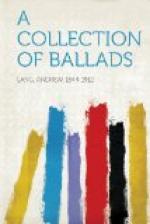“My maides, gae to my dressing-roome,
And dress to me my hair;
Whaireir yee laid a plait before,
See yee lay ten times mair.
“My maids, gae to my dressing-room,
And dress to me my smock;
The one half is o the holland fine,
The other o needle-work.”
The horse Fair Annet rade upon,
He amblit like the wind;
Wi siller he was shod before,
Wi burning gowd behind.
Four and twanty siller bells
Wer a’ tyed till his mane,
And yae tift o the norland wind,
They tinkled ane by ane.
Four and twanty gay gude knichts
Rade by Fair Annet’s side,
And four and twanty fair ladies,
As gin she had bin a bride.
And whan she cam to Marie’s Kirk,
She sat on Marie’s stean:
The cleading that Fair Annet had on
It skinkled in their een.
And whan she cam into the kirk,
She shimmerd like the sun;
The belt that was about her waist
Was a’ wi pearles bedone.
She sat her by the nut-browne bride,
And her een they wer sae clear,
Lord Thomas he clean forgat the bride,
When Fair Annet drew near.
He had a rose into his hand,
He gae it kisses three,
And reaching by the nut-browne bride,
Laid it on Fair Annet’s knee.
Up then spak the nut-browne bride,
She spak wi meikle spite:
“And whair gat ye that rose-water,
That does mak yee sae white?”
“O I did get the rose-water
Whair ye wull neir get nane,
For I did get that very rose-water
Into my mither’s wame.”
The bride she drew a long bodkin
Frae out her gay head-gear,
And strake Fair Annet unto the heart,
That word spak nevir mair.
Lord Thomas he saw Fair Annet wex pale,
And marvelit what mote bee;
But when he saw her dear heart’s blude,
A’ wood-wroth wexed bee.
He drew his dagger that was sae sharp,
That was sae sharp and meet,
And drave it into the nut-browne bride,
That fell deid at his feit.
“Now stay for me, dear Annet,” he sed,
“Now stay, my dear,” he cry’d;
Then strake the dagger untill his heart,
And fell deid by her side.
Lord Thomas was buried without kirk-wa,
Fair Annet within the quiere,
And o the ane thair grew a birk,
The other a bonny briere.
And ay they grew, and ay they threw,
As they wad faine be neare;
And by this ye may ken right weil
They were twa luvers deare.
Ballad: Fair Annie
(Child, Part III., p. 69.)
“It’s narrow, narrow, make your bed,
And learn to lie your lane:
For I’m ga’n oer the sea, Fair Annie,
A braw bride to bring hame.
Wi her I will get gowd and gear;
Wi you I neer got nane.
“But wha will bake my bridal bread,
Or brew my bridal ale?
And wha will welcome my brisk bride,
That I bring oer the dale?”




